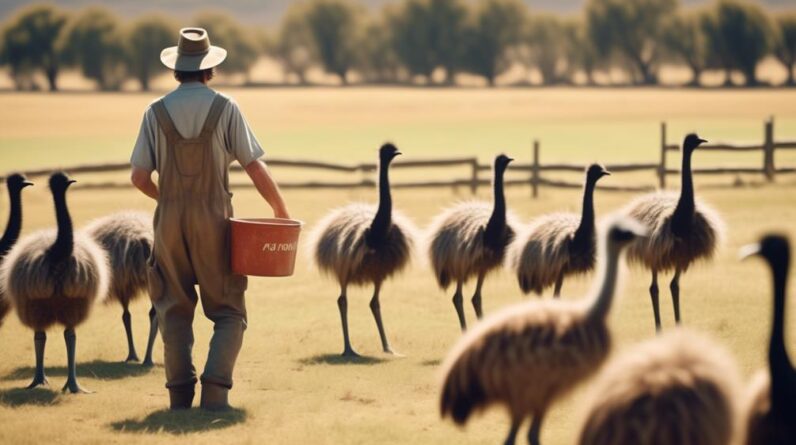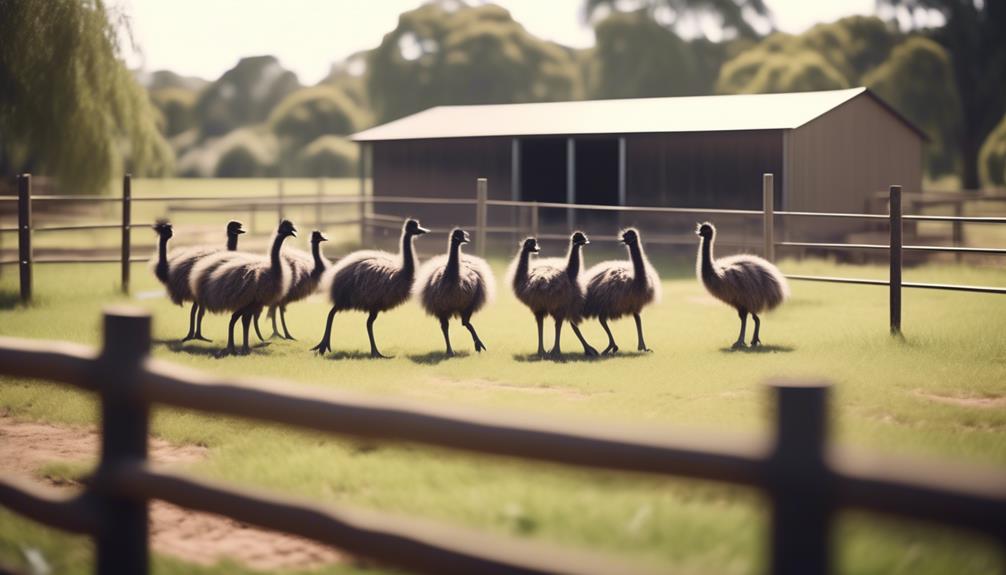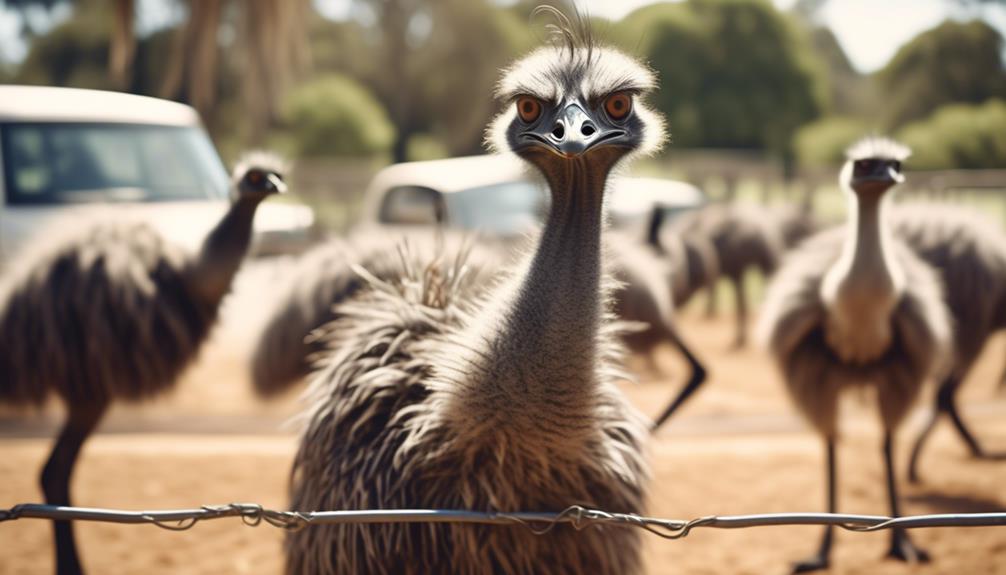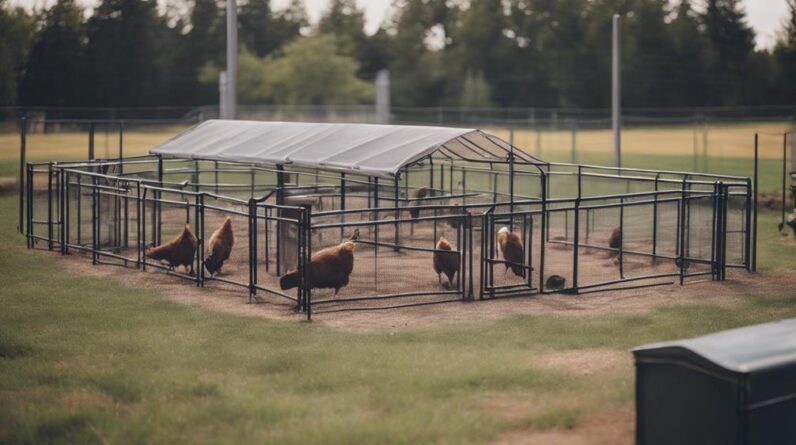
Imagine standing in a vast, open field, the sun casting a warm golden glow on the horizon. In the distance, a group of emus gracefully roam, their strong legs propelling them forward with ease.
You can't help but be captivated by their unique beauty and fascinating behavior. If you've ever considered starting an emu farm, this step-by-step guide is here to help you navigate the exciting journey ahead.
From researching and planning to acquiring emus and ensuring their proper care, each aspect will be carefully laid out to set you on the path towards emu farming success.
So, are you ready to embark on this adventure and discover the secrets behind starting your very own emu farm?
Research and Planning

Before diving into the exciting world of emu farming, it's crucial to conduct thorough research and develop a detailed plan to ensure a successful venture. Developing a marketing strategy and understanding legal requirements are two key aspects of this process.
When it comes to developing a marketing strategy for your emu farm, it's important to identify your target market and understand their needs and preferences. Conduct market research to gain insights into the demand for emu products and the competition in the industry. This will help you determine the best marketing channels and strategies to reach your potential customers. Whether it's selling emu meat, eggs, feathers, or oil, a well-defined marketing strategy will ensure that your products reach the right audience.
Understanding the legal requirements is another crucial step. Before starting your emu farm, you need to research and comply with all the regulations and permits necessary for operating such a business. This includes obtaining the necessary licenses, permits, and certifications. It's also important to be aware of any zoning restrictions or environmental regulations that may apply to your farm.
Selecting the Right Location
To ensure the success of your emu farm, it's essential to carefully choose the right location that meets the specific requirements of these unique birds. When it comes to selecting the right climate for your emu farm, it's crucial to consider their natural habitat. Emus are native to Australia, where the climate is typically hot and dry. Therefore, they thrive in areas with similar climatic conditions.
Evaluating land availability is another important aspect to consider. Emus require a large amount of space to roam and graze, so it's necessary to find a location that offers ample land. Additionally, the land should have good soil quality and be suitable for emu farming. Conducting soil tests and consulting with agricultural experts can help you determine if the land is suitable for emu farming.
Lastly, proximity to markets and transportation routes should also be taken into account. This will ensure that your emu products can be easily transported and sold. By carefully evaluating these factors, you can choose the right location for your emu farm and set yourself up for success.
Setting Up the Facilities

When considering the next step in establishing your emu farm, you'll need to focus on setting up the necessary facilities to ensure the well-being and productivity of your emus. Facility construction plays a crucial role in providing a safe and comfortable environment for your emus to thrive.
Start by building secure enclosures that are spacious enough to allow the emus to move around freely. Emus are large birds and require ample room to exercise and stretch their legs. Additionally, ensure that the enclosures are equipped with proper fencing to prevent any potential escapes or predator attacks.
Biosecurity measures are also essential to protect the health of your emus. Implement strict protocols to prevent the introduction and spread of diseases. This includes having separate quarantine areas for new emus to ensure they're disease-free before joining the rest of the flock. Regularly clean and disinfect the facilities to maintain a hygienic environment.
Furthermore, establish a record-keeping system to track any health issues, treatments, or medications administered to your emus.
Acquiring Emus and Other Necessary Equipment
Now is the time to consider how you'll acquire emus and the necessary equipment for your emu farm. To ensure the success of your venture, it's crucial to source healthy emus from reputable emu breeders. Look for breeders who've a proven track record and offer good customer support. They can provide you with healthy, genetically diverse emus that are well-suited for your farm.
In addition to acquiring emus, you'll also need to invest in the necessary equipment. Here are three key items you should consider:
- Emu Enclosures: Emus require spacious enclosures to roam and thrive. Fencing should be sturdy and tall, as emus are skilled jumpers. Make sure to create separate enclosures for breeding pairs to protect the eggs and provide a safe environment for hatching.
- Feeding and Watering Systems: Emus have specific dietary requirements, including a high-protein diet. Invest in automatic feeding and watering systems to ensure a consistent and balanced diet for your emus. This will save you time and effort on daily feeding tasks.
- Incubators: If you plan to breed emus, investing in incubators is essential. This allows you to hatch emu eggs in a controlled environment, increasing the chances of successful hatching and ensuring the growth of your emu population.
Ensuring Proper Care and Maintenance

With the necessary emus and equipment in place, the next step is to ensure the proper care and maintenance required to keep your emu farm thriving. Health and nutrition management are crucial aspects of maintaining a successful emu farm. Emus require a balanced diet consisting of grains, seeds, fruits, and vegetables to meet their nutritional needs. It is also important to provide them with access to clean water at all times.
Another key factor in ensuring the well-being of your emus is to implement effective breeding and reproduction techniques. Emus are monogamous birds, meaning they mate for life. To encourage successful breeding, it is essential to provide comfortable nesting areas and create a suitable environment for reproduction.
To help you better understand the importance of proper care and maintenance, take a look at the table below:
| Health and Nutrition Management | Emu Breeding and Reproduction Techniques |
|---|---|
| Regular veterinary check-ups | Provide comfortable nesting areas |
| Balanced diet rich in grains, seeds, fruits, and vegetables | Create a suitable environment for reproduction |
| Access to clean water at all times | Encourage bonding between mating pairs |
Frequently Asked Questions
How Much Profit Can Be Expected From Starting an Emu Farm?
Starting an emu farm can be profitable if you understand the key factors for success. Factors such as market demand, proper management, and cost control play a significant role in determining the profitability of your emu farm.
What Are the Potential Challenges or Risks Associated With Running an Emu Farm?
Running an emu farm can present challenges and risks. From the unpredictable weather to the potential health issues, you'll need to be prepared for the unexpected. But with knowledge and dedication, the rewards can be worth it.
Are There Any Legal Requirements or Permits Needed to Start an Emu Farm?
To start an emu farm, there are certain legal requirements and permits you need to comply with. These include regulations and licensing specific to emu farming. It's important to be aware of these legalities before embarking on your venture.
Can Emus Be Raised Alongside Other Livestock, Such as Chickens or Cows?
Yes, emus can be raised alongside other livestock like chickens and cows. Integrating emus into a sustainable farming system can have benefits such as pest control and increased biodiversity. It's important to consider their specific needs and ensure proper housing and fencing.
What Are the Best Marketing Strategies for Selling Emu Products, Such as Meat, Eggs, or Feathers?
To effectively market your emu products and stand out in the crowd, focus on creating a strong brand identity that resonates with your target audience. Explore niche markets and tailor your marketing strategies accordingly.
Conclusion
Congratulations! You have now successfully navigated through the steps of starting an emu farm.
By conducting thorough research, selecting the perfect location, setting up the necessary facilities, acquiring the emus and equipment, and ensuring proper care and maintenance, you're well on your way to a thriving emu farm.
Embrace the exciting journey ahead as you watch your emu farm flourish and your dreams come to life.





